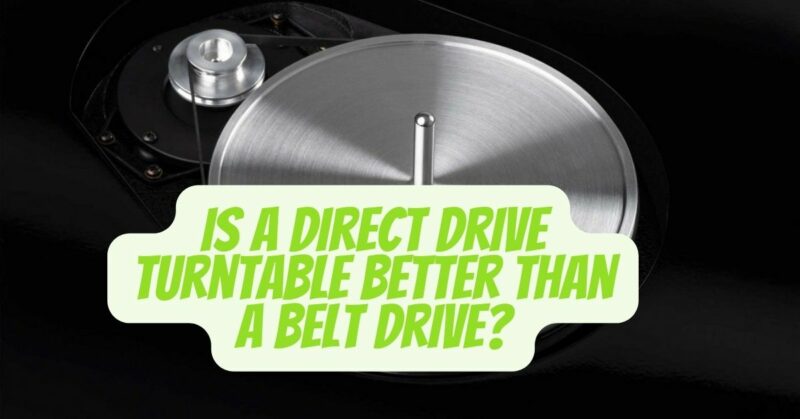The choice between a direct drive and a belt drive turntable has been a subject of debate among vinyl enthusiasts for years. Both types of turntables have their strengths and weaknesses, and whether one is better than the other depends on your specific needs and preferences. In this article, we’ll explore the characteristics of each type and help you decide which might be the better option for your vinyl listening experience.
Direct Drive Turntables:
Direct drive turntables feature a motor directly connected to the turntable platter, resulting in a more direct transmission of power. Here are some advantages and considerations associated with direct drive turntables:
1. Consistent Speed: Direct drive turntables are known for their excellent speed stability. The direct connection between the motor and the platter results in consistent and accurate playback speed, making them ideal for DJs and audiophiles who demand precise speed control.
2. Quick Start and Stop: Direct drive turntables have the advantage of near-instant start and stop times. This makes them well-suited for DJing, where rapid cueing and beat-matching are essential.
3. High Torque: Many direct drive turntables have high torque motors that provide excellent resistance to external forces, ensuring that the platter maintains its speed even when subjected to heavy manipulation or scratching.
4. Low Maintenance: Direct drive turntables are generally lower maintenance than belt drive models because they don’t require belt replacement. This can be a cost-saving and convenient feature.
Belt Drive Turntables:
Belt drive turntables utilize a belt to transfer power from the motor to the platter. While they have some differences compared to direct drive turntables, belt drive models have their own set of advantages and considerations:
1. Reduced Motor Noise: Belt drive turntables tend to produce less motor noise because the motor is physically separated from the platter by the belt. This can result in quieter playback, especially when listening to quieter or classical music.
2. Lower Vibrations: The belt acts as a dampening element, reducing vibrations from the motor that can potentially affect sound quality. This can result in smoother and more detailed audio reproduction.
3. Natural Sound: Belt drive turntables are often favored by audiophiles for their ability to provide a more natural, warm, and organic sound, which some listeners find appealing for certain genres of music.
4. Affordability: Belt drive turntables are generally more budget-friendly, making them an attractive option for beginners or those who want to enjoy vinyl without breaking the bank.
Which Is Better for You?
The choice between a direct drive and a belt drive turntable ultimately depends on your priorities and how you plan to use your turntable:
– Direct Drive for DJs: If you’re a DJ or require precise speed control for mixing and scratching, a direct drive turntable is the better choice due to its speed stability, quick start/stop times, and high torque motor.
– Belt Drive for Audiophiles: If you prioritize sound quality and a natural, warm sound signature, a belt drive turntable may be the better option for serious listening sessions. It’s also a good choice for those on a budget who want to enter the world of vinyl.
– Hybrid Options: Some turntables offer a compromise between direct drive and belt drive characteristics. These hybrid turntables incorporate features from both types, allowing for a balance of stability, sound quality, and affordability.
In conclusion, there is no one-size-fits-all answer to whether a direct drive or belt drive turntable is better. It all comes down to your specific needs, preferences, and how you plan to enjoy your vinyl collection. Both types of turntables have their unique strengths, and the best choice for you is the one that aligns with your musical goals and listening preferences.


